Related Research Articles

Carousel is the second musical by the team of Richard Rodgers (music) and Oscar Hammerstein II. The 1945 work was adapted from Ferenc Molnár's 1909 play Liliom, transplanting its Budapest setting to the Maine coastline. The story revolves around carousel barker Billy Bigelow, whose romance with millworker Julie Jordan comes at the price of both their jobs. He participates in a robbery to provide for Julie and their unborn child; after it goes tragically wrong, he is given a chance to make things right. A secondary plot line deals with millworker Carrie Pipperidge and her romance with ambitious fisherman Enoch Snow. The show includes the well-known songs "If I Loved You", "June Is Bustin' Out All Over" and "You'll Never Walk Alone". Richard Rodgers later wrote that Carousel was his favorite of all his musicals.
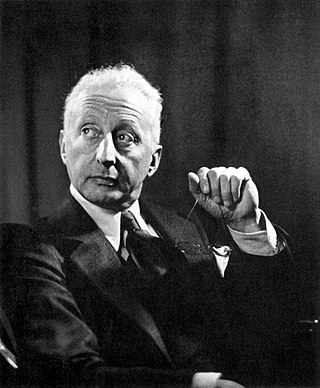
Jerome David Kern was an American composer of musical theatre and popular music. One of the most important American theatre composers of the early 20th century, he wrote more than 700 songs, used in over 100 stage works, including such classics as "Ol' Man River", "Can't Help Lovin' Dat Man", "A Fine Romance", "Smoke Gets in Your Eyes", "The Song Is You", "All the Things You Are", "The Way You Look Tonight" and "Long Ago ". He collaborated with many of the leading librettists and lyricists of his era, including George Grossmith Jr., Guy Bolton, P. G. Wodehouse, Otto Harbach, Oscar Hammerstein II, Dorothy Fields, Johnny Mercer, Ira Gershwin and Yip Harburg.

Musical theatre is a form of theatrical performance that combines songs, spoken dialogue, acting and dance. The story and emotional content of a musical – humor, pathos, love, anger – are communicated through words, music, movement and technical aspects of the entertainment as an integrated whole. Although musical theatre overlaps with other theatrical forms like opera and dance, it may be distinguished by the equal importance given to the music as compared with the dialogue, movement and other elements. Since the early 20th century, musical theatre stage works have generally been called, simply, musicals.

Richard Charles Rodgers was an American composer who worked primarily in musical theater. With 43 Broadway musicals and over 900 songs to his credit, Rodgers was one of the most well-known American composers of the 20th century, and his compositions had a significant influence on popular music.

Otto Abels Harbach, born Otto Abels Hauerbach was an American lyricist and librettist of nearly 50 musical comedies and operettas. Harbach collaborated as lyricist or librettist with many of the leading Broadway composers of the early 20th century, including Jerome Kern, Louis Hirsch, Herbert Stothart, Vincent Youmans, George Gershwin, and Sigmund Romberg. Harbach believed that music, lyrics, and story should be closely connected, and, as Oscar Hammerstein II's mentor, he encouraged Hammerstein to write musicals in this manner. Harbach is considered one of the first great Broadway lyricists, and he helped raise the status of the lyricist in an age more concerned with music, spectacle, and stars. Some of his more famous lyrics are "Smoke Gets in Your Eyes", "Indian Love Call" and "Cuddle up a Little Closer, Lovey Mine".

The King and I is the fifth musical by the team of Rodgers and Hammerstein. It is based on Margaret Landon's novel Anna and the King of Siam (1944), which is in turn derived from the memoirs of Anna Leonowens, governess to the children of King Mongkut of Siam in the early 1860s. The musical's plot relates the experiences of Anna, a British schoolteacher who is hired as part of the King's drive to modernize his country. The relationship between the King and Anna is marked by conflict through much of the piece, as well as by a love to which neither can admit. The musical premiered on March 29, 1951, at Broadway's St. James Theatre. It ran for nearly three years, making it the fourth-longest-running Broadway musical in history at the time, and has had many tours and revivals.
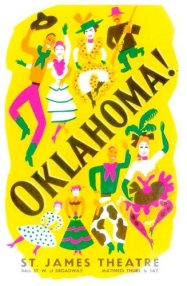
Oklahoma! is the first musical written by the duo of Rodgers and Hammerstein. The musical is based on Lynn Riggs's 1931 play, Green Grow the Lilacs. Set in farm country outside the town of Claremore, Indian Territory, in 1906, it tells the story of farm girl Laurey Williams and her courtship by two rival suitors, cowboy Curly McLain and the sinister and frightening farmhand Jud Fry. A secondary romance concerns cowboy Will Parker and his flirtatious fiancée, Ado Annie.

This is a list of notable events in music that took place in the year 1928.
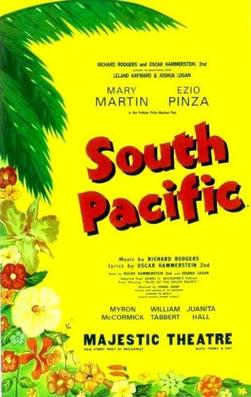
South Pacific is a musical composed by Richard Rodgers, with lyrics by Oscar Hammerstein II and book by Hammerstein and Joshua Logan. The work premiered in 1949 on Broadway and was an immediate hit, running for 1,925 performances. The plot is based on James A. Michener's Pulitzer Prize–winning 1947 book Tales of the South Pacific and combines elements of several of those stories. Rodgers and Hammerstein believed they could write a musical based on Michener's work that would be financially successful and, at the same time, send a strong progressive message on racism.

Rodgers and Hammerstein was a theater-writing team of composer Richard Rodgers (1902–1979) and lyricist-dramatist Oscar Hammerstein II (1895–1960), who together created a series of innovative and influential American musicals. Their musical theater writing partnership has been called the greatest of the 20th century.
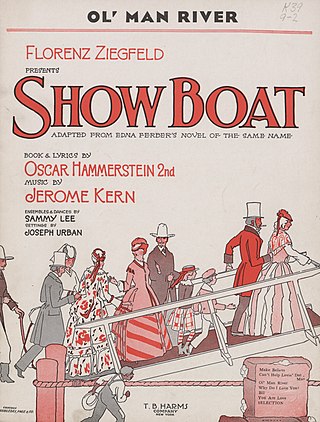
Show Boat is a musical with music by Jerome Kern and book and lyrics by Oscar Hammerstein II. It is based on Edna Ferber's best-selling 1926 novel of the same name. The musical follows the lives of the performers, stagehands and dock workers on the Cotton Blossom, a Mississippi River show boat, over 40 years from 1887 to 1927. Its themes include racial prejudice and tragic, enduring love. The musical contributed such classic songs as "Ol' Man River", "Make Believe", and "Can't Help Lovin' Dat Man".

Flower Drum Song was the eighth musical by the team of Rodgers and Hammerstein. It is based on the 1957 novel, The Flower Drum Song, by Chinese-American author C. Y. Lee. It premiered on Broadway in 1958 and was then performed in the West End and on tour. It was adapted for a 1961 musical film.

Charles Strouse is an American composer and lyricist best known for writing the music to such Broadway musicals as Bye Bye Birdie, Applause, and Annie.

Bert Kalmar was an American songwriter, who was inducted into the Songwriters Hall of Fame in 1970. He was also a screenwriter.

In Dahomey: A Negro Musical Comedy is a landmark 1903 American musical comedy described by theatre historian Gerald Bordman as "the first full-length musical written and played by blacks to be performed at a major Broadway house." It features music by Will Marion Cook, book by Jesse A. Shipp, and lyrics by poet Paul Laurence Dunbar. It was written by Jesse A. Shipp as a satire on the American Colonization Society's back-to-Africa movement of the earlier nineteenth century.

Me and Juliet is a musical with music by Richard Rodgers, and lyrics and book by Oscar Hammerstein II. The sixth stage collaboration by Rodgers & Hammerstein, it tells a story of romance backstage at a long-running musical: assistant stage manager Larry woos chorus girl Jeanie behind the back of her electrician boyfriend, Bob. Me and Juliet premiered in 1953 and was considered a modest success — it ran for much of a year on Broadway and had a limited run in Chicago, and returned a small profit to its backers.
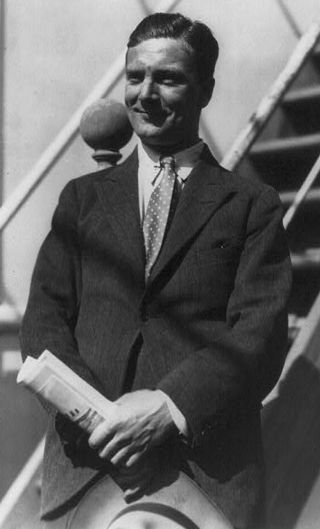
Dennis King was an English actor and singer.

Song of the West is a 1930 American Pre-Code musical western film produced by Warner Bros., and photographed entirely in Technicolor. It was based on the 1928 Broadway musical Rainbow by Vincent Youmans (music), Oscar Hammerstein II (lyrics) and Laurence Stallings (book). It starred John Boles, Joe E. Brown and Vivienne Segal, and was the first all-color all-talking feature to be filmed entirely outdoors.
Russell Brown was an American actor of stage, television, and screen. He also had a career as a journalist, working for several newspapers in the city of Philadelphia. On stage, he is a best known for his Tony Award-winning role of Benny Van Buren in the 1955 Broadway musical Damn Yankees; a role he also reprised on film in 1958. Other highlights of his work in film were his portrayal of Captain Brackett in Rodgers and Hammerstein's 1958 movie version of the 1949 Broadway musical South Pacific, and as park caretaker George Lemon in the classic courtroom drama, Anatomy of a Murder (1959). On television he portrayed the recurring character of Thomas Jones, the father of the title character, in the legal drama The Law and Mr. Jones from 1960–1962.

Rodgers & Hammerstein's Cinderella is a 1997 American musical fantasy television film produced by Walt Disney Television, directed by Robert Iscove, and written by Robert L. Freedman. Based on the French fairy tale of the same name by Charles Perrault, the film is the second remake and third version of Rodgers and Hammerstein's musical, which originally aired on television in 1957. Adapted from Oscar Hammerstein II's book, Freedman modernized the script to appeal to more contemporary audiences by updating its themes, particularly re-writing its main character into a stronger heroine. Co-produced by Whitney Houston, who also appears as Cinderella's Fairy Godmother, the film stars Brandy in the title role and features a racially diverse ensemble cast consisting of Jason Alexander, Whoopi Goldberg, Bernadette Peters, Veanne Cox, Natalie Desselle, Victor Garber, and Paolo Montalban.
References
- 1 2 3 4 Thomas S. Hischak (2007). "Rainbow". The Rodgers and Hammerstein Encyclopedia. Bloomsbury Academic. pp. 229–230. ISBN 9780313341403.
- ↑ Edwin M. Bradley (2004). The First Hollywood Musicals: A Critical Filmography of 171 Features, 1927 Through 1932. McFarland. pp. 184–185. ISBN 9780786420292.
- 1 2 3 4 5 Dan Dietz (2019). "Rainbow". The Complete Book of 1920s Broadway Musicals. Rowman & Littlefield Publishers. pp. 492–494. ISBN 9781538112823.
- 1 2 Brooks Atkinson (November 22, 1928). "THE PLAY; Rainbow". The New York Times . p. A33.